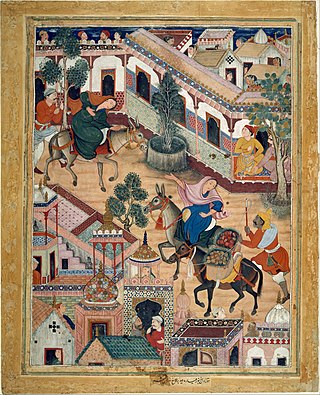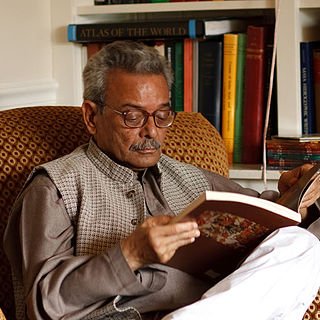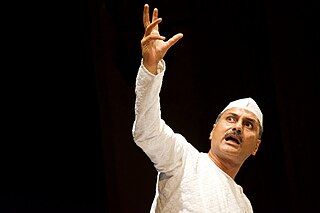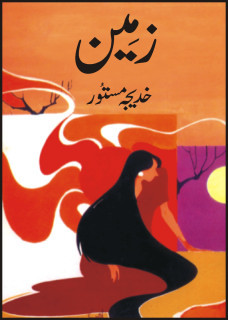
The Hamzanama or Dastan-e-Amir Hamza narrates the legendary exploits of Hamza ibn Abdul-Muttalib, an uncle of Muhammad. Most of the stories are extremely fanciful, "a continuous series of romantic interludes, threatening events, narrow escapes, and violent acts". The Hamzanama chronicles the fantastic adventures of Hamza as he and his band of heroes fight the enemies.

Mir Babar Ali Anees, also known as Mir Anees was an Indian Urdu poet. He used his pen-name (takhallus) of Anees in poetry. Anees used Persian, Urdu, Arabic, and Sanskrit words in his poetry. Anis wrote prolonged Marsias, which was a custom of his times, but nowadays only selected sections are narrated even in religious ceremonies. He died in 1291 Hijra, corresponding with 1874 CE.

Urdu literature comprises the literary works, written in the Urdu language. While it tends to be dominated by poetry, especially the verse forms of the ghazal and nazm, it has expanded into other styles of writing, including that of the short story, or afsana. Urdu literature is popular mostly in Pakistan, where Urdu is the national language, and in India, where it is an Eighth Schedule language.
Intizar Hussain or Intezar Hussain was a Pakistani writer of Urdu novels, short stories, poetry and nonfiction. He is widely recognised as a leading literary figure of Pakistan.
Tabish Khair is an Indian English author and associate professor in the Department of English, University of Aarhus, Denmark. His books include Babu Fictions (2001), The Bus Stopped (2004), which was shortlisted for the Encore Award (UK) and The Thing About Thugs (2010), which has been shortlisted for a number of prizes, including the DSC Prize for South Asian Literature and the Man Asian Literary Prize. His poem Birds of North Europe won first prize in the sixth Poetry Society All India Poetry Competition held in 1995. In 2022, he published a new Sci Fi novel, [The Body by the Shore].

Shamsur Rahman Faruqi was an Indian Urdu language poet, author, critic, and theorist. He is known for ushering modernism to Urdu literature. He formulated fresh models of literary appreciation that combined Western principles of literary criticism and subsequently applied them to Urdu literature after adapting them to address literary aesthetics native to Arabic, Persian, and Urdu. Some of his notable works included Sher-e-Shor Angez (1996), Ka’i Chand The Sar-e Asman (2006), The Mirror of Beauty (2013), and The Sun that Rose from the Earth (2014). He was also the editor and publisher of the Urdu literary magazine Shabkhoon.
The Tale of the Four Dervishes, known as Bāgh-o Bahār in Urdu, is a collection of allegorical stories by Amir Khusro written in Persian in the early 13th century.

Ratan Nath Dhar Sarshar was an Indian Urdu novelist, columnist and editor from British India. Born into a Kashmiri Brahmin family which settled in Lucknow, he received his education at Canning College and later took up employment as a schoolteacher. In August 1878, he was appointed editor of the Lucknow-based newspaper Avadh Akhbar, in which his most famous work Fasana-e-Azad was published serially.
Shahbano Bilgrami is a Pakistani writer, editor, poet, and book/film reviewer.

Mahmood Farooqui is an Indian writer, performer and director. He specializes in a type of story-telling known as Dastangoi. Farooqui along with his uncle Shamsur Rahman Faruqi, noted Urdu poet and literary critic, revived Dastangoi, the ancient art of Urdu story telling. He was awarded the Ustad Bismillah Khan Yuva Puraskar in 2010 for it.

Dastangoi is a 13th century Urdu oral storytelling art form. The Persian style of dastan evolved in 16th century. One of the earliest references in print to dastangoi is a 19th-century text containing 46 volumes of the adventures of Amir Hamza titled Dastan e Amir Hamza.

Nasir Abbas Nayyar is a Pakistani Urdu language writer, critic, columnist, and essayist. He has written books on poetry, literary theory and post colonial study of Urdu literature. He has produced some important books on structuralism and postmodernism and their influence on Urdu literature. A book on life and poetics of Majid Amjid is another his significant contribution. His most famous work is on Postcolonial Study of Urdu Literature published by Oxford University Press, Karachi, Pakistan titled Mabad Nau Abadiat and Urdu Adab ki Tashkeel e Jadid. His books on post colonialism proved ground breaking works in Urdu.

AMU Literary Festival is an annual literary festival organised by Aligarh Muslim University. University Debating and Literary Club (UDLC) formerly University Literary Club of the university organises the festival. Some of the previous invitees include news anchor and author Rajdeep Sardesai, poet Keki N. Daruwalla, politician Mani Shankar Aiyar and independent journalist Rana Ayyub.

Fasana-e-Azad is an Urdu novel by Ratan Nath Dhar Sarshar. It was serialized in Avadh Akhbar between 1878 and 1883 before it was published in four large volumes by the Nawal Kishore Press. The story follows a wandering character named Azad and his companion, Khoji, from the streets of late-nineteenth-century Lucknow to the battlefields of the Russo-Turkish War (1877–1878) in Constantinople and Russia. The work's status as a novel has been debated, but it is thought by most scholars to be one of the first novels in Urdu.
Lucknawi, Lucknavi, Lakhnavi or Lakhnawi is a Muslim surname from Urdu, meaning someone from Lucknow in India. It may refer to the following people:
A Bengali Kissa, also known as Keccha, is a genre of Bengali poetry and prose as well as a tradition in the Bengali language of oral story-telling. It started flourishing in Bengal with the fusion of local Bengali folklore and stories from the Arab and Turco-Persian immigrants. The art form remains popular amongst the rural Muslim communities of Bangladesh.
Bilal Tanweer is a Pakistani writer and translator from Lahore. His novel The Scatter Here Is Too Great was awarded the Shakti Bhatt First Book Prize in 2014, and was shortlisted for the DSC Prize for South Asian Literature and the Chautauqua Prize in 2015. He received the PEN Translation Fund Grant for his translation of Muhammad Khalid Akhtar's novel Chakiwara Mein Visaal.

Zameen, alternatively spelled Zamin, is an Urdu novel by Pakistani novelist and short story writer Khadija Mastoor. The novel was published posthumously by Idara-e-Farogh-e-Urdu in 1983. Daisy Rockwell, PhD, translated it into English and released it in July 2019 under the title A Promised Land. Zameen depicts the economic and political upheaval that entailed the partition of British India. It begins at the final setting of Mastoor's first novel Aangan – the Walton refugee camp in Lahore. Consequently, it is sometimes considered an extension of Aangan, however, Rockwell has clarified that it is not a narrative sequel, rather a philosophical and thematic follow-up. It is considered a political allegory and a women-centric historical account of Pakistan's independence.
Umro Ayyar or Amar Ayyar is a fictional character, an ayyār, in Tilism-e-Hoshruba, an Urdu recension of the Islamic epic Hamzanama. He was first written about during the time of Mughal Emperor Akbar and many stories and novels have been written about him since.










